2017 年北京延庆中考英语真题及答案
听力理解(共 30 分)
一、听对话,从下面各题所给的 A、B、C 三幅图片中选择与对话内容相符的图片。每段对话你将听
两遍。(共 5 分,每小题 1 分)
�
二、听对话或独白,根据对话或独白的内容,从下面各题所给的 A、B、C 三个选项中选择最佳选项。
每段对话或独白你将听两遍。(共 15 分,每小题 1.5 分)
请听一段对话,完成第 6 至第 7 小题。
6. What does the woman want to drink?
A. Tea.
B. Milk.
C. Juice.
7. How much does the woman pay?
A. $7.
B. $8.
C. $9.
请听一段对话,完成第 8 至第 9 小题。
8. Where are the speakers going to have a picnic?
A. In the park.
B. On the hill.
C. At the seaside.
9. Who will join the speakers for the picnic?
A. The boy’s dad.
B. The boy’s grandpa.
C. The boy’s grandma.
请听一段对话,完成第 10 至第 11 小题。
10. How did the boy go to the wild animal park?
A. By train.
B. By car.
C. By bus.
11. What did the boy do in the wild animal park?
A. He drew a picture.
B. He fed an elephant.
C. He saw a bird show.
请听一段对话,完成第 12 至第 13 小题。
12. What are the speakers mainly talking about?
A. Different reading skills.
B. Some benefits of reading.
C. The man’s reading habits.
13. What does the man think of reading?
A. He believes it is enjoyable.
B. He finds it a little difficult.
C. He thinks it takes too much time.
请听一段独白,完成第 14 至第 15 小题。
14. What can we know about the speaker?
A. She lives near her school.
B. She likes traveling abroad.
C. She wants to improve her English.
15. Why does the speaker send this message?
A. To describe her trip in London.
B. To tell the way to her house.
C. To introduce her hometown.
三、听对话,记录关键信息。本段对话你将听两遍。(共 10 分,每小题 2 分)请根据所听到的对话内
�
容和提示词语,将所缺的关键信息填写在答题卡的相应位置上。
知识运用(共 25 分)
四、单项选择(共 10 分,每小题 1 分)
从下面各题所给的 A、B、C、D 四个选项中,选择可以填入空白处的最佳选项。
21. My father is a worker.
is very kind.
A. He
B. She
C. His
D. It
22. More and more young people go skating
winter.
A. at
B. in
C. on
D. to
23. ---
did you stop playing?
--- Because I was tired.
A. How
B. Why
C. When
D. Where
24. The hotel is very old. It’s one of
buildings in the city.
A. old
B. older
C. oldest
D. the oldest
25. ---
I hand in the report today?
--- No, you needn’t.
A. Can
B. Must
C. Shall
D. Could
26. --- How do you usually go to school?
--- I
to school on foot.
A. go
B. went
C. was going
D. will go
27. My mother
some washing when the telephone rang.
A. does
B. did
C. is doing
D. was doing
28. Lily is my classmate. We
each other since she came to our school.
A. know
B. knew
C. have known
D. will know
29. The mobile phone
in 1973.
A. invents
B. is invented
C. invented
D. was invented
30. --- Judy, could you tell me_______the schoolbag?
--- Oh, yes. I bought it in a store on the Internet.
�
A. where did you buy
B. where will you buy
C. where you bought
D. where you will buy
五、完形填空(共 15 分,每小题 1.5 分)
阅读下面的短文,掌握其大意,然后从短文后各题所给的 A、B、C、D 四个选项中,选择最佳选项。
Emily was an eighth grader. To pass her Civics course(公民课程), she had to do some
A Meaningful Gift
volunteer
service in a nursing home for a week.
One Monday, Emily went to the nursing home after school. When she arrived, she was told
she would
___31 an hour every weekday with an elderly lady, Mrs. Blair. She was then led into a room,
where an old
lady in a flowery dress was sitting on a sofa.
Emily 32 awkwardly(别扭地)in front of the lady. She cleared her throat and said,
“Good afternoon.
I’m Emily.”
“Good afternoon, Emily. Take a seat, please.” Mrs. Blair replied.
Then, 33 filled the space between them. Emily wondered what to say.
“Tell me about yourself, Emily,” Mrs. Blair said suddenly.
“Well,” Emily started, “I don’t have any grandparents, so I can’t relate to
elderly people much. I love the
performing arts. I’m here mainly because I have to 34
here to get a good grade for my Civics class.”
Mrs. Blair didn’t seem to 35 . “Many people, especially teens, don’t seem to care about
old people like me. Now you are here, and I’m going to change that about you. Ask me
anything.”
Emily thought for a moment, and finally decided, “What was your job?”
“I was a Broadway star in the 1950s.” Mrs. Blair answered.
“Cool! Can you tell me about it?” Emily asked, amazed.
Mrs. Blair smiled. “Back then, only the lead actress had the honor to wear a 36
bracelet. I was
the lead in almost all of the plays, so I always wore the bracelet. Till this day, I still
have it.”
Emily smiled along with Mts. Blair and listened to the other stories, attentively. She
had become so interested in Mrs. Blair’s 37 that she decided to come earlier the next day.
Tuesday, Wednesday, and Thursday passed by quickly. Then came Friday. As she was
leaving, Emily
�
was really 38 to say goodbye.
“Don’t be sad. You can still visit me,” Mrs. Blair comforted her. She then handed a
small box to Emily,“It’s my gift to you.”
Emily 39 opened the box and was surprised to see what was inside. “It’s the bracelet
that you wore. Thank you!” Emily said, with tears in her eyes. “I’m sure to visit you
whenever I’m free.”
On the way home, Emily thought of her own love for the performing arts. She touched the
bracelet and made a 40 that she would keep her word to Mrs. Blair.
31.A. waste
B. spend
C. plan
D. exercise
32. A. asked
B. sat
C. stood
D. danced
33. A. warmth
B. sadness
C. happiness
D. silence
34.A. study
B. live
C. volunteer
D. play
35. A. mind
B. fear
C. insist
D. regret
36. A. strange
B. special
C. common
D. private
37. A. dreams
B. hobbies
C. stories
D. jokes
38. A. upset
B. confused
C. surprised
D. nervous
39. A. proudly
B. secretly
C. worriedly
D. carefully
40. A. promise
B. change
C. judgment
D. choice
阅读理解(共 50 分)
六、阅读下列短文,根据短文内容,从短文后各题所给的 A、B、C、D 四个选项中,选择最佳选项。
(共 30 分,每小题 2 分)
A
Summer Programs at Museums
�
41. You can join in the programs at the Postal Museum any day _______.
A. from July 17 to 23
B. from July 29-30
C. from August 7-20
D. from August 21 to 27
42. If you are interested in the program about video arts, you can phone _______.
A. 965-0400
B. 654-0930
C. 357-3030
D. 272-0560
43. A 15-year-old student can take part in the programs at _______.
A. the Building Museum
B. the Postal Museum
C. the Air and Space Museum
D. the Science Museum
44. In the Air and Space Museum, you can _______.
A. create a stamp
B. build a house
C. make a paper airplane
D. explore a future city
The Sixth Time I Went to the Principal’s Office
B
When I was in the seventh grade, I had problems behaving. My heart was in the right
place, but I couldn’t always follow the rules. I played many tricks on my schoolmates.
Once, I even pulled a girl’s hair on the school bus to get her attention. As a result, I
�
was repeatedly sent to the office of the principal(校长).
Although I hated going there, I did not hate the principal, Mr. Ratcliff.
Mr. Ratcliff was a kind, elderly man. When he spanked( 打屁股) me for putting some
ants into a classmate’s pencil box, it didn’t hurt at all, but it did hurt my feelings. I
thought so much of him and moments like that seemed to prove I was hopelessly bad.
When I got called to Mr. Ratcliff’s office for the sixth time, I had no idea what I
had done. I felt disappointed as I walked down there. I went into his office, sat down, and
looked at the floor. Then he said the last thing I expected to hear:” Kevin, I’ve heard
you’ve been behaving really well lately. I want you to
know how proud I am of you, and I just called you down to my office to give you a
peppermint.”
“Really?” I was surprised.
“Yes. Now you can take that peppermint and go back to class.”
I carried the peppermint with me as if it was a gold coin. When I got into my
classroom, I bragged ( 吹嘘) to my classmates about my turnaround,excitedly. I wasn’t so
bad after all.
Mr. Ratcliff was really kind. He made me realize that I was just a kid who had problems
with behavior.He bought some peppermints and took the time to notice me when I got
something-anything-right. Mr.Ratcliff gave me some hope by giving me some love. I will just
remember him for the rest of my life.
45. In his seventh grade, the writer __________.
A. hated the principal
B. had problems behaving
C. always followed the rules
D. often helped his classmates
46. How did the writer feel when he went to the principal’s office for the sixth time?
A. Lonely.
B. Excited.
C. Confident.
D. Disappointed.
47. The sixth time the writer went to the principal’s office, he got __________.
A. a peppermint
B. a model bus
C. a pencil box
D. a coin
48. The writer will always remember Mr. Ratcliff, because the principal __________.
A. talked with him in the office
B. played games with him
C. expected him to be a teacher
D. gave him some hope and love
C
�
Buying Is Doing?
How important is shopping to you? How much time do you spend buying things? And how
much time do you spend organizing these things in your home? In the future, how much time
will you spend in movie theaters, at amusement parks, at shopping malls, or at convenience
stores? When you add it all up, you will probably see you spend a lot of your life
consuming(消费)things. Consuming products is not necessarily
bad. However, if we spend too much time doing it, we should look at it carefully.
Imagine that you have a week off from school. You don’t have to go to class. However,
in this week,you cannot spend any money ----- no shopping, no movies, no eating out. How
would you spend your time?
What things would bring you happiness? Perhaps you would take a walk with your best friend.
Perhaps you would help a child read. Or you might spend time with your family.
When we look back, it is likely that non-consuming experiences like these will be our
most important memories. Why? Non-consuming activities are active, not passive. They don’t
come in a package. You make
the experience yourself. For example, each person who reads to
a child will have a different experience. The
experience changes with the reader, the
child, and the book. Similarly, when you have a conversation with a
friend, you are
actively creating an experience. The conversation that you have with your friend cannot be
experienced or recreated by anyone else. However, if you watch a movie with a friend, you
will each have a
p ackage experience. It requires no action and little interaction betw een
the two of you.
The environment we live in encourages us to have packaged experiences. We feel that we
must consume
because we believe that buying is doing. However, we can start a personal
revolution ( 变革) against
consumerism. How? By consuming less. We can ask ourselves
what experiences bring us the greatest satisfaction. Then we can organize our lives so
that we have more of those kinds of experiences.
49. If consuming products takes too much time, we should ____________.
A. spend less money
B. think about it carefully
C. organize our things
D. go to convenience stores
50. According to the passage, the writer believes that _____________.
A. we can say no to consumerism by consuming less
B. buying things can bring us the greatest satisfaction
C. the environment seldom influences our shopping choices
D. consuming experiences will be our most important memories
51. What is the writer’s main purpose in writing this passage?
A. To introduce some ways of enjoying our spare time.
�
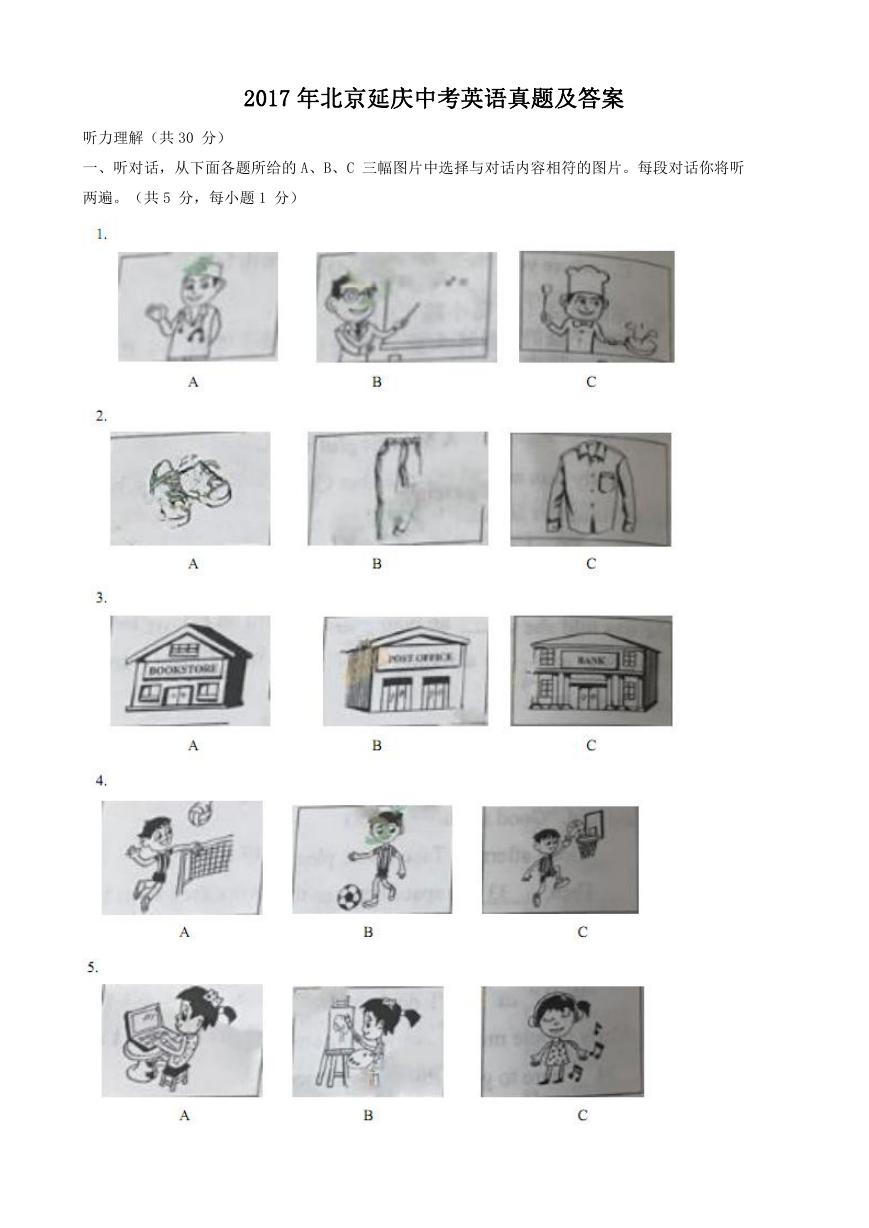
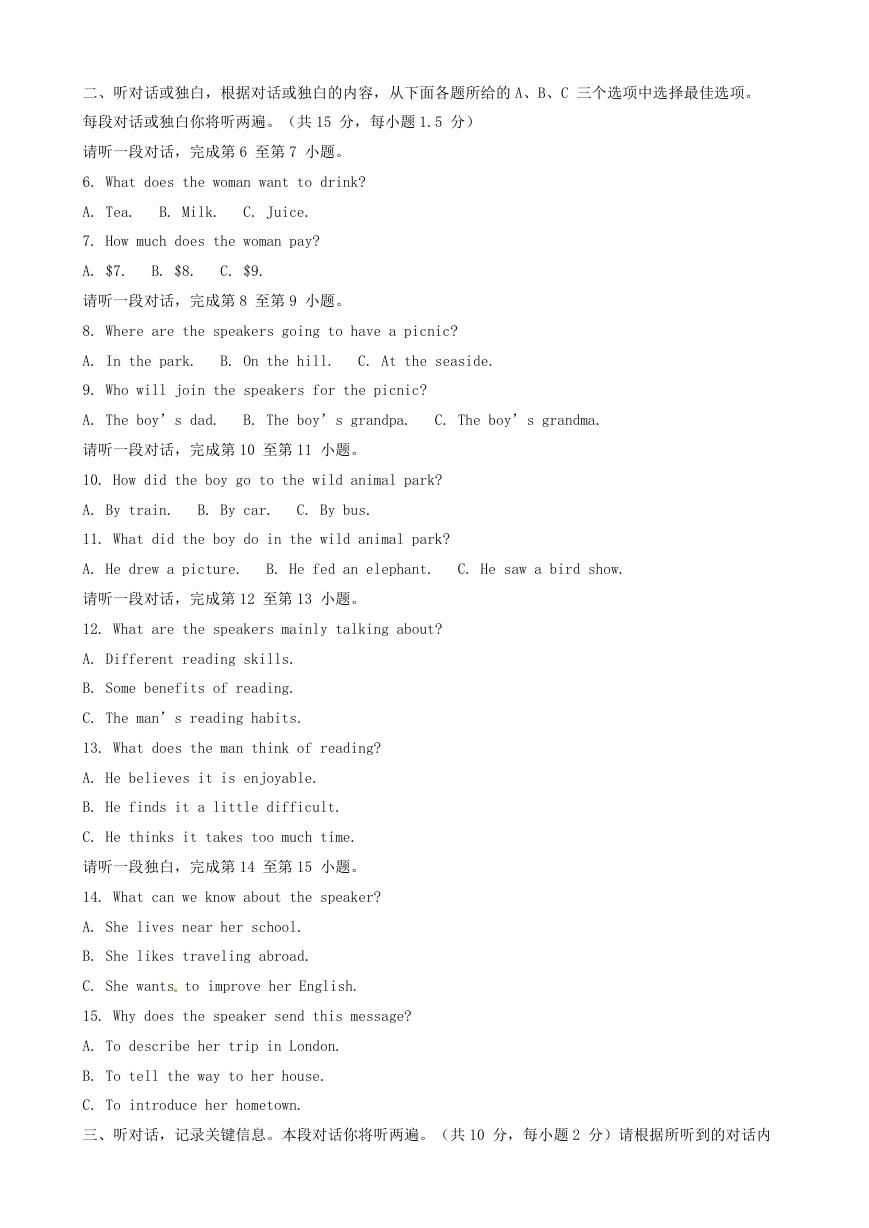
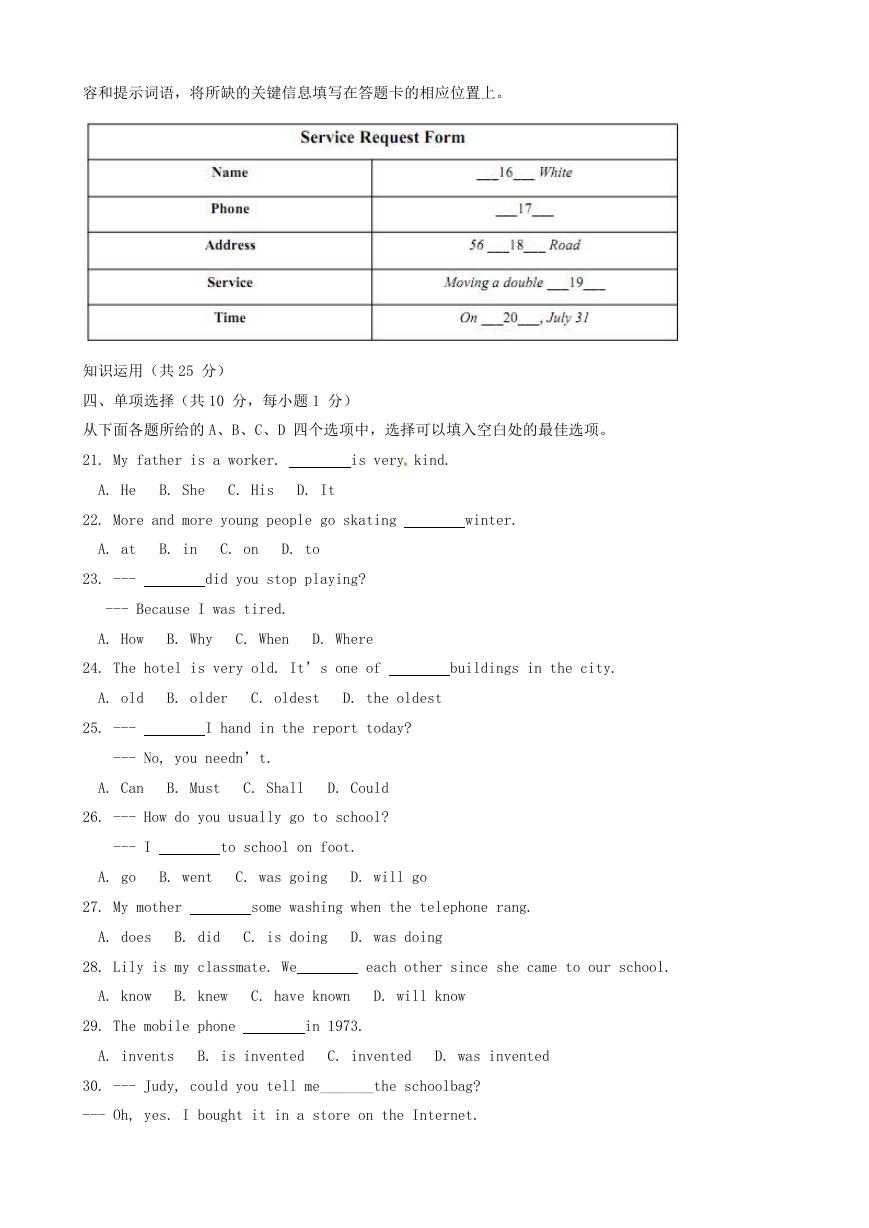
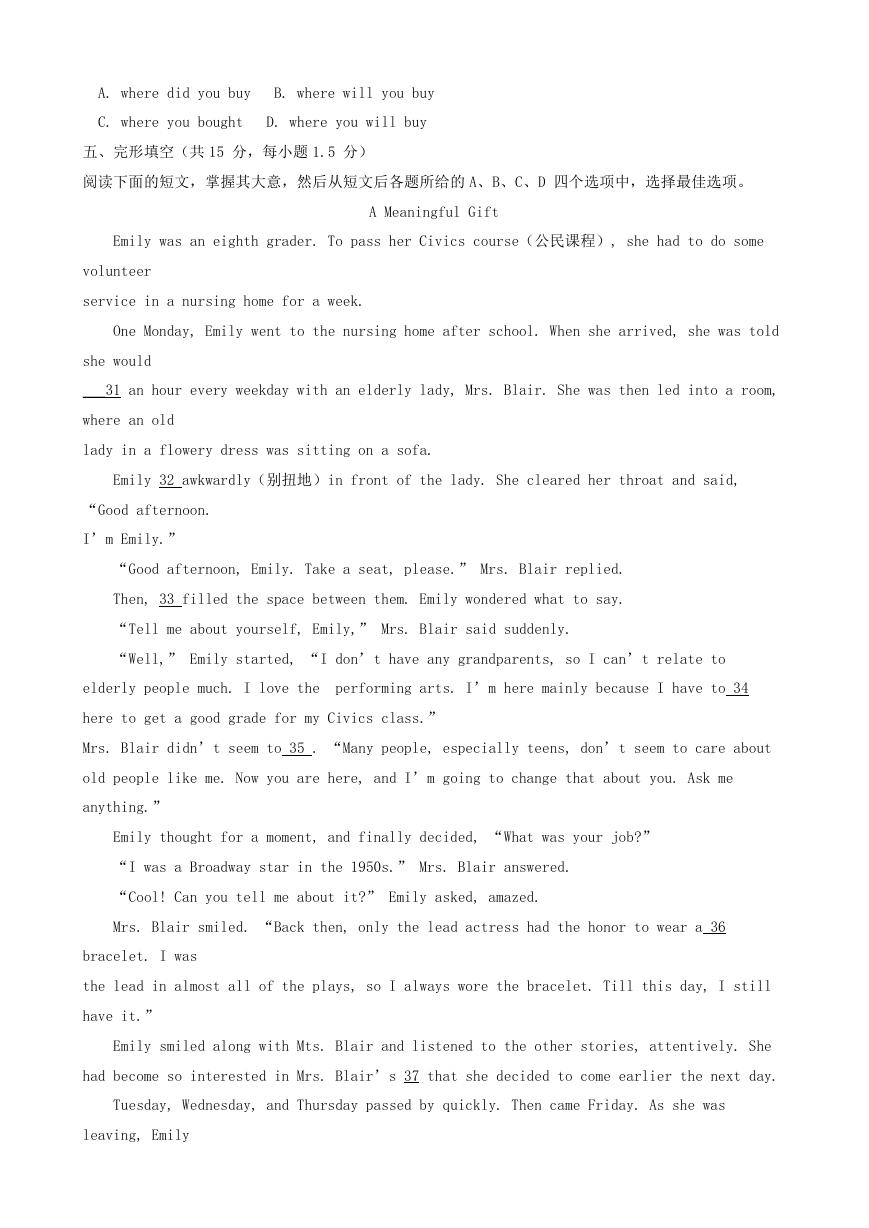
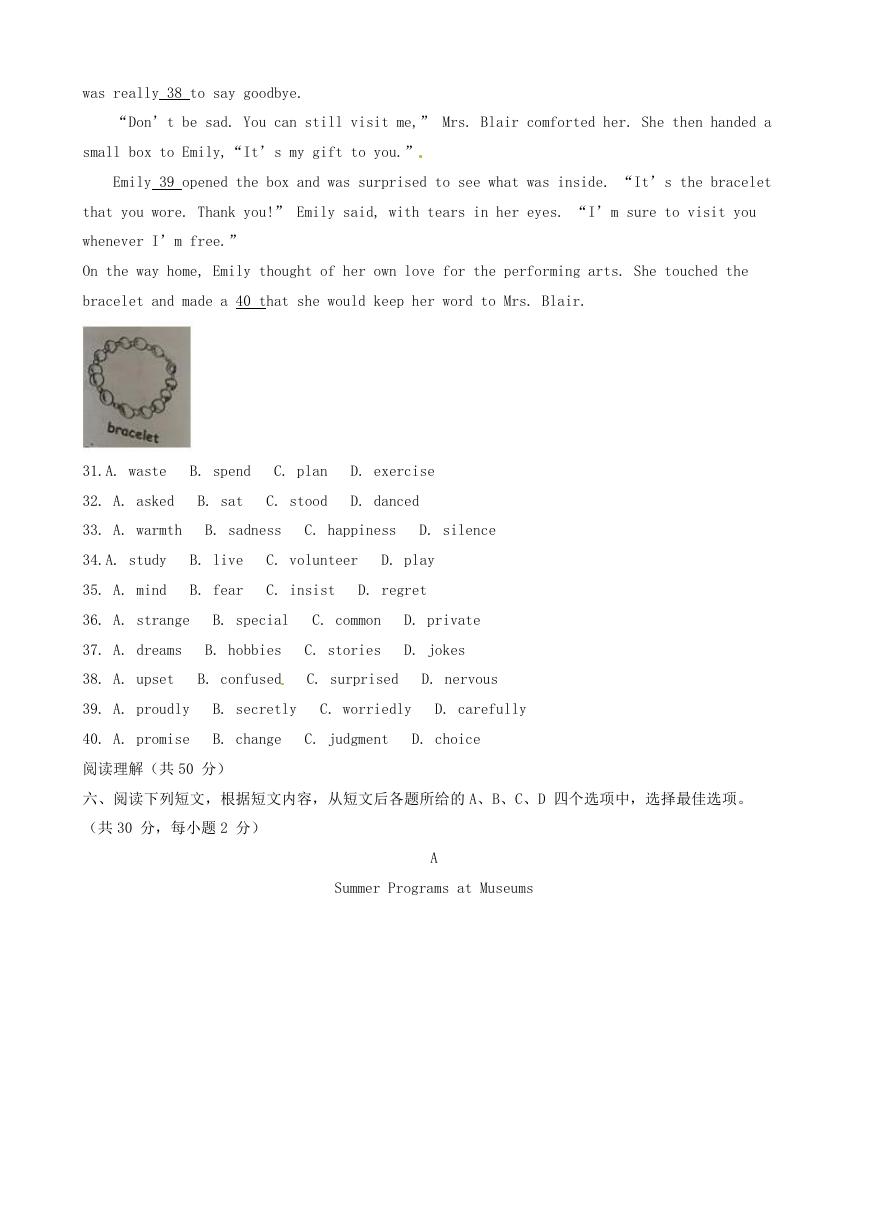
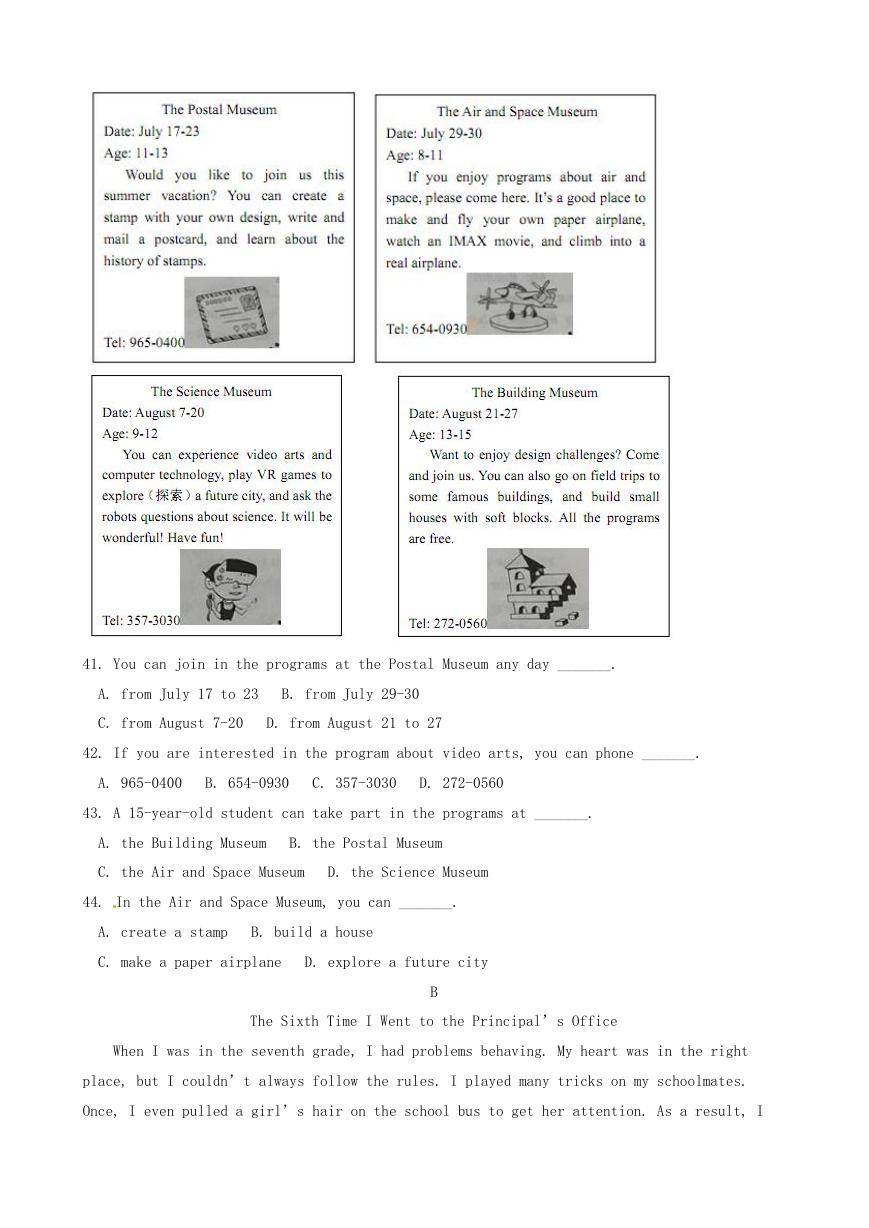
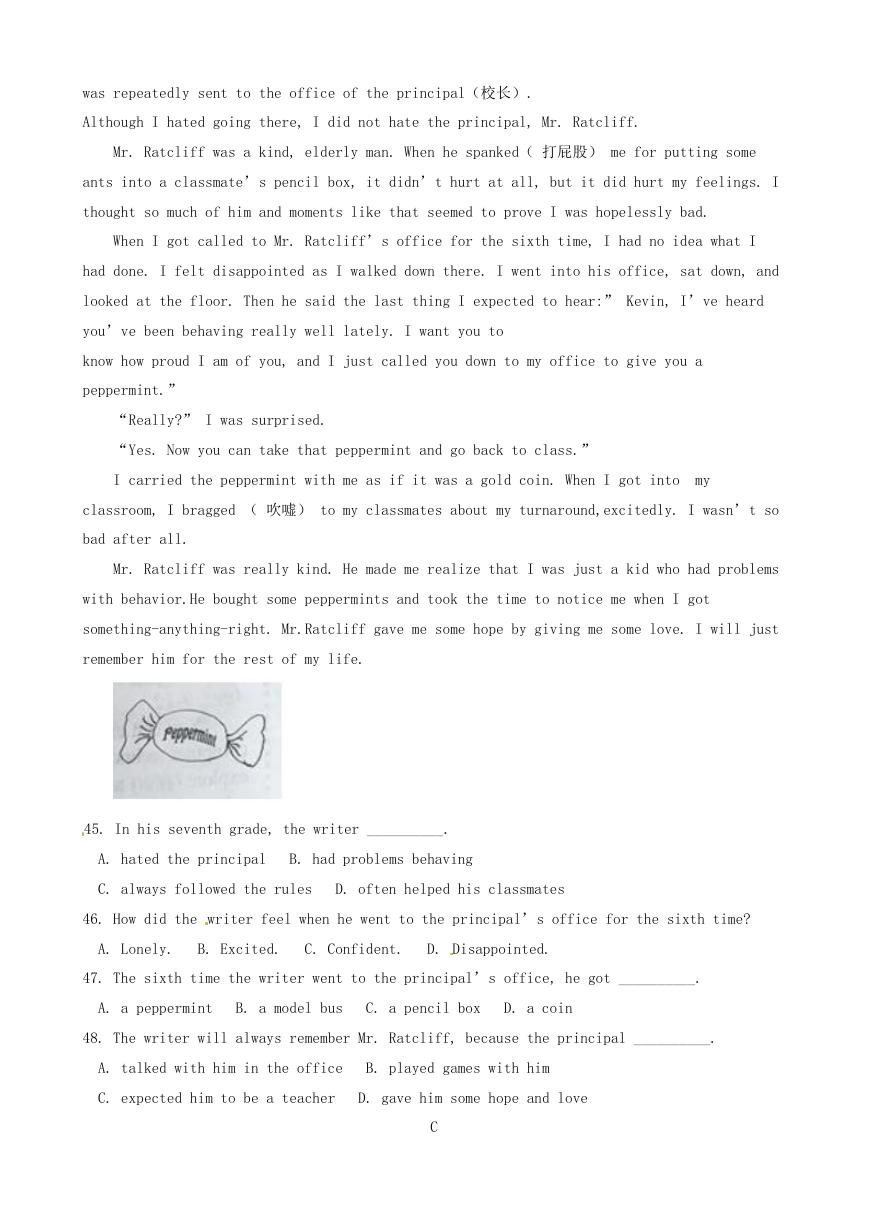
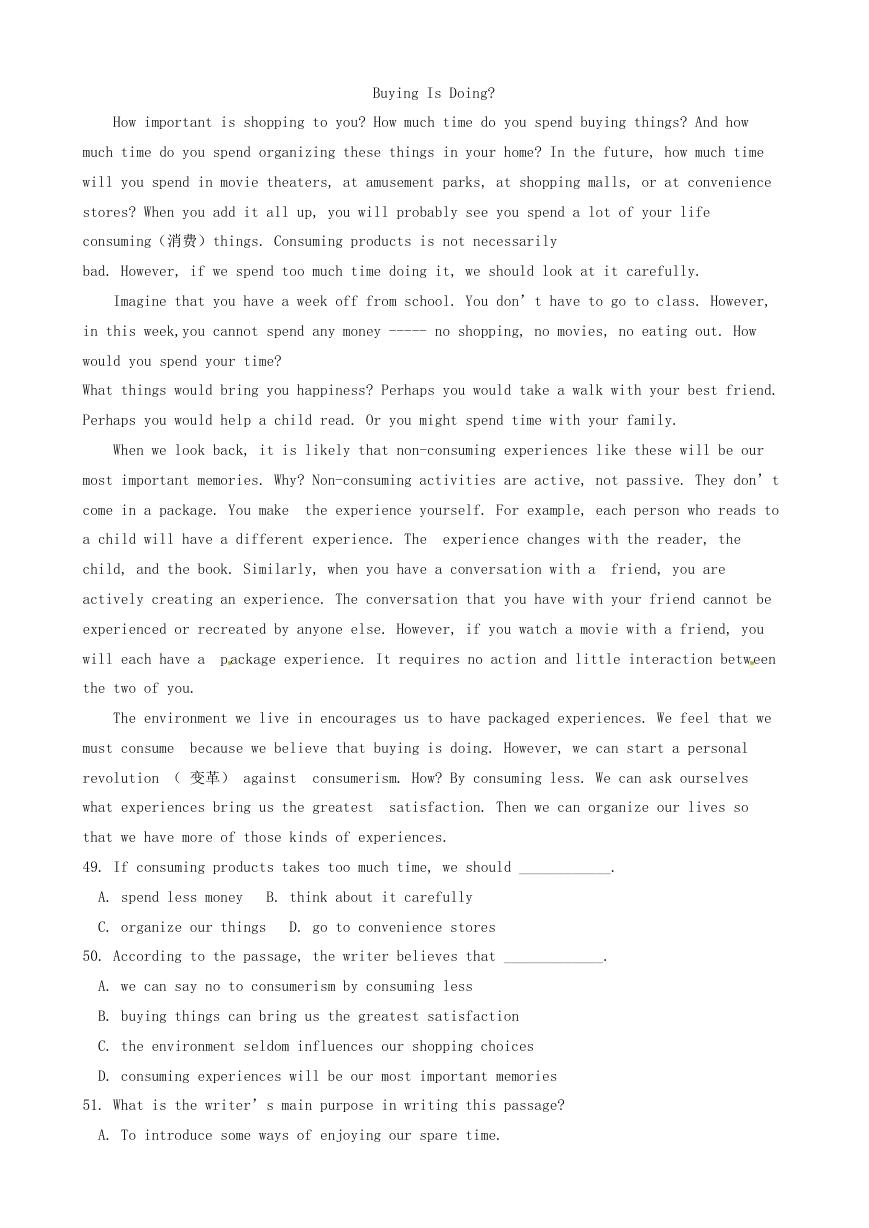








 2023年江西萍乡中考道德与法治真题及答案.doc
2023年江西萍乡中考道德与法治真题及答案.doc 2012年重庆南川中考生物真题及答案.doc
2012年重庆南川中考生物真题及答案.doc 2013年江西师范大学地理学综合及文艺理论基础考研真题.doc
2013年江西师范大学地理学综合及文艺理论基础考研真题.doc 2020年四川甘孜小升初语文真题及答案I卷.doc
2020年四川甘孜小升初语文真题及答案I卷.doc 2020年注册岩土工程师专业基础考试真题及答案.doc
2020年注册岩土工程师专业基础考试真题及答案.doc 2023-2024学年福建省厦门市九年级上学期数学月考试题及答案.doc
2023-2024学年福建省厦门市九年级上学期数学月考试题及答案.doc 2021-2022学年辽宁省沈阳市大东区九年级上学期语文期末试题及答案.doc
2021-2022学年辽宁省沈阳市大东区九年级上学期语文期末试题及答案.doc 2022-2023学年北京东城区初三第一学期物理期末试卷及答案.doc
2022-2023学年北京东城区初三第一学期物理期末试卷及答案.doc 2018上半年江西教师资格初中地理学科知识与教学能力真题及答案.doc
2018上半年江西教师资格初中地理学科知识与教学能力真题及答案.doc 2012年河北国家公务员申论考试真题及答案-省级.doc
2012年河北国家公务员申论考试真题及答案-省级.doc 2020-2021学年江苏省扬州市江都区邵樊片九年级上学期数学第一次质量检测试题及答案.doc
2020-2021学年江苏省扬州市江都区邵樊片九年级上学期数学第一次质量检测试题及答案.doc 2022下半年黑龙江教师资格证中学综合素质真题及答案.doc
2022下半年黑龙江教师资格证中学综合素质真题及答案.doc